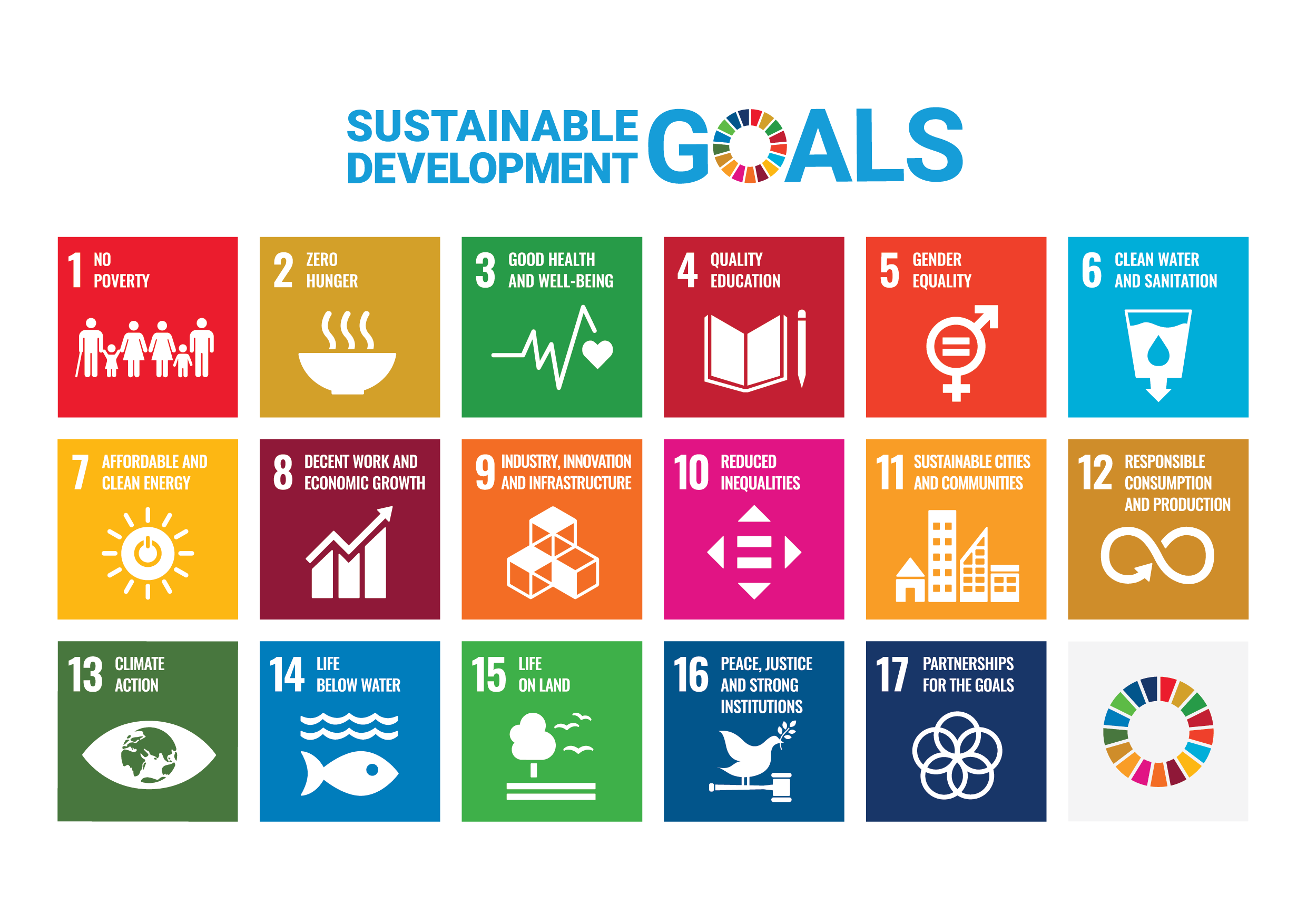What is Sustainability?
According to the United Nations (UN), sustainability is:
"meeting the needs of the present without compromising the ability of future generations to meet their own needs."
— United Nations Brundtland Commission, 1987
What are the SDG?
The Sustainable Development Goals (SDG) form the framework for improving the lives of populations around the world and mitigating the hazardous man-made effects of climate change.
They are a collection of 17 connected global goals established by the UN in 2015 as part of the 2030 Agenda for Sustainable Development. They address the global challenges we face, including those related to poverty, inequality, climate change, environmental degradation, peace and justice.
The 17 SDGs are:
- No Poverty - End poverty in all its forms everywhere.
- Zero Hunger - End hunger, achieve food security, improve nutrition, and promote sustainable agriculture.
- Good Health and Well-being - Ensure healthy lives and promote well-being for all at all ages.
- Quality Education - Ensure inclusive and equitable quality education and promote lifelong learning opportunities for all.
- Gender Equality - Achieve gender equality and empower all women and girls.
- Clean Water and Sanitation - Ensure availability and sustainable management of water and sanitation for all.
- Affordable and Clean Energy - Ensure access to affordable, reliable, sustainable, and modern energy for all.
- Decent Work and Economic Growth - Promote sustained, inclusive, and sustainable economic growth, full and productive employment, and decent work for all.
- Industry, Innovation and Infrastructure - Build resilient infrastructure, promote inclusive and sustainable industrialization, and foster innovation.
- Reduced Inequalities - Reduce inequality within and among countries.
- Sustainable Cities and Communities - Make cities and human settlements inclusive, safe, resilient, and sustainable.
- Responsible Consumption and Production - Ensure sustainable consumption and production patterns.
- Climate Action - Take urgent action to combat climate change and its impacts.
- Life Below Water - Conserve and sustainably use the oceans, seas, and marine resources.
- Life on Land - Protect, restore, and promote sustainable use of terrestrial ecosystems, forests, and biodiversity.
- Peace, Justice and Strong Institutions - Promote peaceful and inclusive societies, provide access to justice for all, and build effective, accountable institutions.
- Partnerships for the Goals - Strengthen global partnerships to support and achieve the SDGs.
Each goal contains specific targets and indicators designed to measure progress toward achieving sustainable development by 2030.
Pros and Cons
Pros
- Universal Framework - The SDGs apply to all countries, recognizing that sustainable development challenges exist everywhere, not just in developing nations.
- Comprehensive Scope - The SDGs address interconnected issues spanning poverty, environment, governance, and economic development, providing a holistic approach to global challenges.
- Measurable Targets - Each goal includes specific, measurable targets with indicators, enabling tracking of progress and accountability.
- Inclusive Development Process - The SDGs were developed through extensive global consultations, making them more representative of diverse perspectives and needs.
- Partnerships and Collaboration - The framework emphasizes partnerships between governments, private sector, civil society, and international organizations.
- Political Momentum - The SDGs have created significant political commitment and awareness around sustainable development issues globally.
Cons
- Overwhelming Complexity - Critics argue that the goals do not go far enough, with SDG targets moving incrementally toward 2030 while many people cannot wait that long.
- Lack of Binding Enforcement - The SDGs are voluntary commitments without legal enforcement mechanisms, relying on political will and peer pressure.
- Measurement Challenges - Many indicators lack reliable data, particularly in developing countries, making accurate progress assessment difficult.
- Funding Gaps - The estimated $2.5 trillion annual funding gap for SDG implementation represents a significant challenge for achievement.
- Western-Centric Approach - The SDGs have been criticised for reproducing a universal template grounded in western and neoliberal ideology.
Are They Still Valid?
The SDGs remain valid and relevant, but their implementation faces significant challenges.
Reasons for Continued Validity
- Enduring Relevance - The fundamental challenges addressed by the SDGs - poverty, inequality, climate change, and environmental degradation - remain as pressing as ever, if not more so.
- Adaptable Framework - The broad nature of the SDGs allows for adaptation to changing circumstances and emerging challenges, such as the COVID-19 pandemic respo
- Global Consensus - Despite implementation challenges, the SDGs continue to represent the most comprehensive global consensus on sustainable development priorities.
- Monitoring and Learning - The UN provides comprehensive assessments of the 2030 Agenda through official reports that monitor global progress, enabling continuous learning and adaptation.
Conclusion
The SDGs remain valid as a framework for addressing global challenges, but their implementation approach requires significant reform. While the goals themselves reflect enduring global priorities, the current trajectory suggests that the 2030 timeline is unrealistic for most targets.
The SDGs continued relevance lies not in their specific timeline but in their role as a north star for global development efforts. They provide a common language and framework for international cooperation, policy alignment, and resource mobilization. However, achieving meaningful progress requires addressing fundamental implementation challenges including financing, governance, measurement, and political commitment.
Rather than abandoning the SDGs, we should focus on accelerating implementation through innovative approaches, increased financing, stronger accountability mechanisms, and adaptation to emerging challenges while maintaining the framework's core principles of leaving no one behind and achieving sustainable development for all.
So please, don't re-invent the wheel! SDG's remains the main source for tracking and achieving sustainability.
Links
- Global Compact Network Netherlands
comments & suggestions
